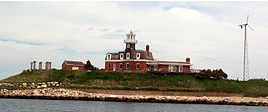State of Independence
In 1988, Dean Kamen, the inventor of the Segway, declared a new independent nation state.
The Kingdom of North Dumpling
After consulting an expert on constitutional law, Kamen found a means for the island he owns and where he lives, just off the coast of Connecticut, to secede from the USA.
He created his own island nation with its own constitution, anthem, flag, and currency (the Dumpling of course). He even persuaded President George H W Bush to sign a non-aggression pact with North Dumpling.
All this arose because the State of New York who administered the island refused permission for a wind turbine on the grounds that it would be too noisy and disturb the neighbours – even though Kamen is the only resident of the island, a mile offshore in Fishers Island Sound.

But the thing is . . .
Although Kamen generates all his own energy to power the house and the lighthouse he’s not really independent.
To actually be independent the island would have to be entirely self sufficient, not dependent of anyone else for anything.
You and I like to think of ourselves as ‘independent’ but it all depends on what we mean by independence.
Most people would say that being independent means not being controlled by anyone, not being told what they can and cannot do or when they are allowed or not allowed to do things.
At a national level it’s usually more about being subject to laws, regulations and especially taxes in one form or another imposed by a colonial power, organization of states, or as in Kamen’s case a State or Federal government.
In 1776 the United States itself declared its independence from the United Kingdom because its citizens, many of whom had originally come from the UK, no longer desired to live by the ‘rules’ imposed by Britain.
In all examples of independence there is always some level of dependence.
The USA would never have got off the ground were it not for its dependence on trade with the UK and other countries.
Neither would the other former British colonies who remained significantly dependent on the UK for some time after gaining their ‘independence’ from British ‘rule’ in the middle of the 20th century.
In fact, after independence a slightly different relationship usually comes into being – co-dependence, where the parties concerned become dependent and reliant on each other for the maintenance of their way of life.
You see . . .
There’s really no such thing as ‘independence’.
Although you and I think and act for ourselves we still depend on one another for many things and many reasons.
You and I make our own decisions, but these are still dependent on the circumstances and environment in which they are made.
You or I would probably think long and hard about moving permanently to an island that didn’t have a broadband connection for example, because most of us depend on having that facility.
Unless we are willing to cut ourselves off from the rest of the world and are able to do this in such a way that we will be entirely self-sufficient to cater for all our needs and wants, then ‘independence’ is a myth.
Some people might find this rather disappointing. They thought they were ‘in charge’ of their own lives but forget that their lifestyle depends on many things outside their control.
But the truth is that we are all co-dependent. You and I depend on other people.
We may or may not have a relationship with them, we may not even know who they are. We depend on people all over the world to turn up for work to produce the products and services on which we depend.
And sometimes . . .
You and I gain a higher level of independence by depending more on other people.
In order to achieve our goals to do the things that we do best or like to do we have to depend on others to do the things that we could do ourselves but get in the way of what we want to do.

